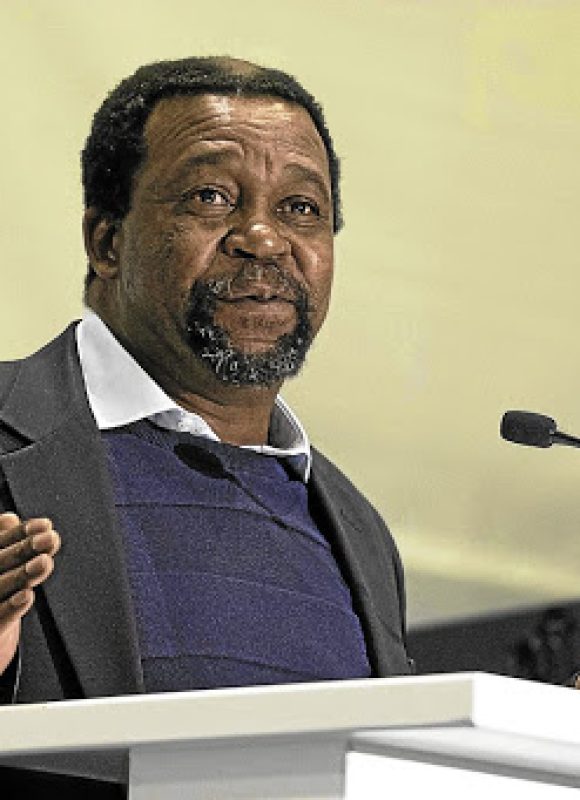PIONEER
Joel Netshitenzhe

Politician | Journalist | Negotiator
Born : 21 December 1956
“We all have a broad common idea about where we want our country to be, as elaborated in those lofty words in our Constitution … to attain those ideals will require hard work and sacrifice. All of us, including the young South Africans that everyone would like to take to lunch, are keenly aware that our nation cannot sustain the levels of inequality obtaining in our society …"
Who is
Joel Netshitenzhe?
Exiled African National Congress (ANC) member during the struggle, politician, writer and policy analyst who became the head of communications for President Mandela.
Professions
and Roles
Committee (NEC) member, Executive Director of the Mapungubwe Institute for Strategic Reflection (MISTRA); Member of the Boards of the Council for Scientific and Industrial Research (CSIR).
Best Known For
Netshitenzhe was a member of the ANC negotiation team during the transition, and after 1994 became the head of communications for President Mandela and head of the Policy Unit in the Presidency under President Thabo Mbeki.
Life highlights
- Netshitenzhe joined the ANC and wrote for Radio Freedom and Mayibuye, later becoming its editor. He also served as the Deputy Head of the ANC’s Department of Information and Publicity.
- He served as a member of the ANC Politico-Military Council.
- Netshitenzhe returned from exile to serve as a member of the ANC negotiating team during the Convention for a Democratic South Arica (CODESA) and the Multi-Party Negotiating Forum (MPNF).
- After the first elections, Netshitenzhe was President Mandela’s Head of Communication.
- In 1998, Netshitenzhe joined the GCIS as its first CEO. The GCIS was tasked with overseeing the transformation of the government communications system and fulfilling new constitutional requirements.
- In 2001, when Thabo Mbeki was elected President, Netshitenzhe served as the Head of Policy Coordination and Advisory Services in the Presidency.
- Netshitenzhe retired from government work in 2009, but remains active in politics as a member of the NEC of the ANC and a member of the first National Planning Commission between 2010 and 2015.
IN THEIR OWN WORDS
“We all have a broad common idea about where we want our country to be, as elaborated in those lofty words in our Constitution … to attain those ideals will require hard work and sacrifice. All of us, including the young South Africans that everyone would like to take to lunch, are keenly aware that our nation cannot sustain the levels of inequality obtaining in our society … This becomes even more critical as the nation knuckles down to develop a common vision and strategic plan about where we should be in 15 to 20 years. That future belongs to you [the youth], more than anyone else. And we thus hope that the voice of the youth will be heard more forcefully than ever before, as we elaborate the trajectory towards a national democratic society in which you and your children will live. And so, my message is a simple one. South Africa stands at the cusp of decision. Whether we tip in the direction of faster progress depends to a large measure on whether we unlock the talent of the nation’s youth. To achieve this, we need to harness that cocktail of youth and ability that makes works of genius possible.”
– Joel Netshitenzhe, June 2010, at the Mail & Guardian gathering of 200 Young South Africans
IN THE WORDS OF OTHERS
“Netshitenzhe is an ANC person through and through … Since 1994 he’s been a government man through and through … He had a hand in most of the brainy stuff that’s happened in government. Whenever you hear of a 15-year review, it was him. Difficult questions about industrial policy went back to his office, development priorities would be his priorities. If Thabo Mbeki famously wrote his own speeches, then it was Joel Netshitenzhe who made happen the stuff the speeches were about … [he was] one of the nicest people in government. He would answer any question; he was like the teacher who can see how the kid came to the wrong conclusion. Even if you asked it in a bad way, he would understand where you were coming from, and give you a serious answer.”
– Stephen Grootes, journalist, on Netshitenzhe on his retirement in 2009
